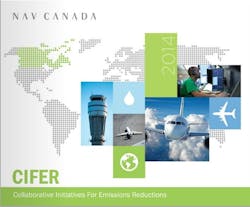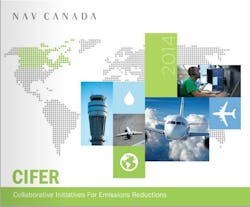Emerging air traffic management technologies, procedures reduce emissions and fuel costs, NAV CANADA reports
OTTAWA, Ontario, 30 Oct. 2014. "Working co-operatively with our airline customers and other industry partners, our efforts resulted in a GHG emissions reduction of 1.3 million metric tons and a fuel cost savings of over $500 million in 2013 alone," says NAV CANADA President and CEO John Crichton.
NAV CANADA officials the 2014 edition of its Collaborative Initiatives for Emission Reductions (CIFER), an annual progress report on the effort to reduce the aviation industry's impact on the environment. The CIFER report profiles initiatives designed to reduce fuel burn and lessen associated greenhouse gas (GHG) emissions and “summarizes new and emerging air traffic management technologies and procedures along with some efficiency initiatives already established," Crichton adds. "The reduction and projected reductions in GHG emissions from 1997 to 2020 is an estimated 21 million tonnes with the attendant fuel cost savings of $7.4 billion achieved and forecast."
Several initiatives are making a significant impact and exemplify true innovation and creativity, officials say. Among them is the Gander Oceanic Flight Level Initiative (GO-FLI), whereby controllers are able offer more efficient altitudes to pilots, increasing the number of climbs in Atlantic airspace.
Another innovation implemented in northern airspace optimizes flight routes, reducing distance and travel times for North American flights bound for Europe and Asia and vice-versa. As much as 5 minutes or 25 miles are saved per flight for a total savings of $6 million in 2013.
The first phase of the Windsor-Toronto-Montreal corridor airspace redesign has been in effect since February 2012 and has reduced cumulative flying time by 10 hours daily and reduced GHG emissions by 15,000 tonnes annually. The next phases, scheduled for Fall 2014 and Spring 2015, will realize an additional 16,000 tonne reduction in annual GHG emissions.
NAV CANADA is the country's private sector civil air navigation services provider. With operations from coast to coast to coast, NAV CANADA provides air traffic control, flight information, weather briefings, aeronautical information services, airport advisory services, and electronic aids to navigation.

